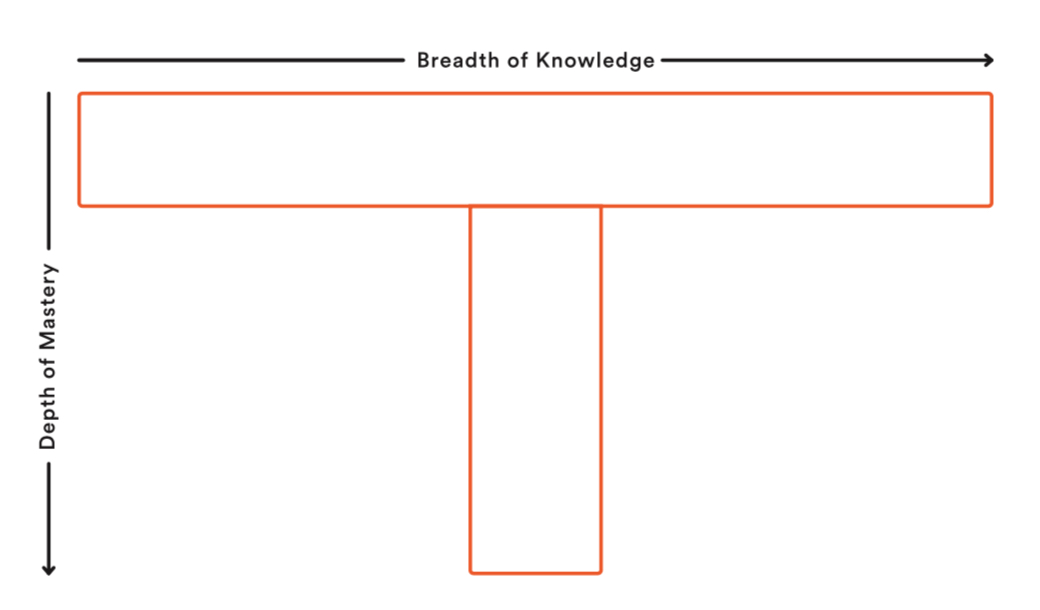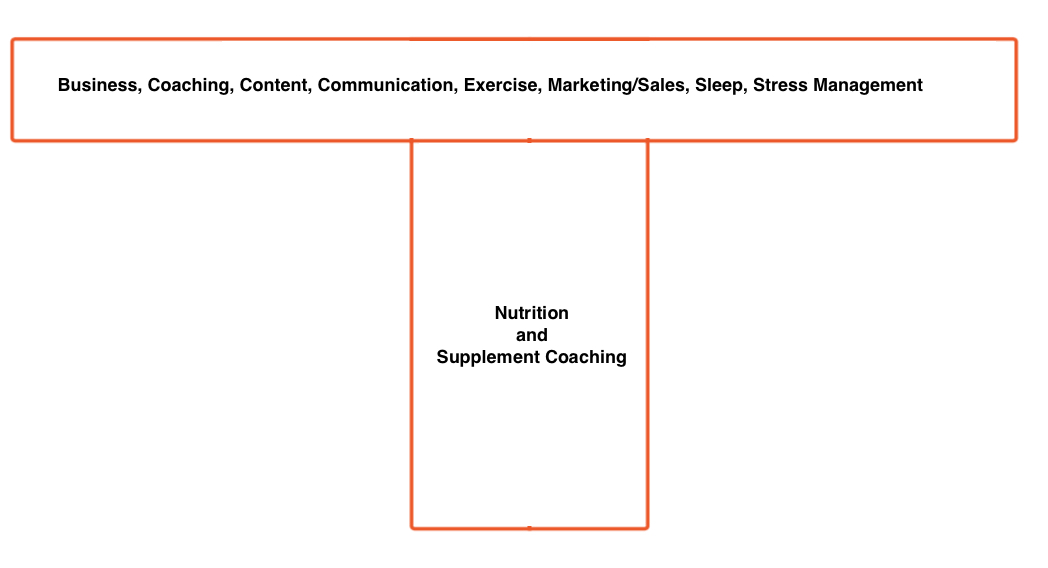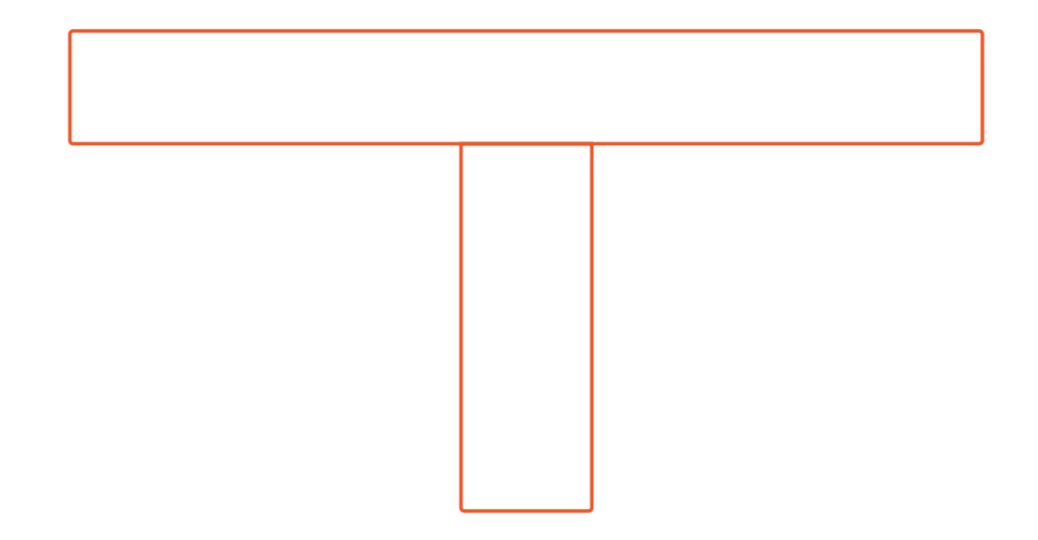The T-Shaped Curriculum Model: What Ernest Hemingway Can Teach You About Planning Your Career In Health And Fitness
++
For most health and fitness professionals, career planning is random: A seminar here, a course there. A textbook here, a journal article there. A conference here, a webinar there. This scattershot approach wastes time, money, and energy. This article offers a better plan, using 4 important questions and my #1 favorite career planning tool.
++
Your New Relationship With Education
As a kid, I hated school.
I’m not sure if I hated it because school was mandatory, because we had to sit at desks all day, or because we had to learn the same things, at the same pace, regardless of our aptitude. But, even now, after a long and successful post-secondary run, “education” can still give me the shivers.
What about you?
Did you love your high school years? Or spit-ball your way to detention? Think your chemistry teacher was a wizard? Or worry about your lit teacher’s relationship with Chaucer? Love solving algebraic equations? Or, like me, hate it all (but discover the fountain of knowledge later)?
Either way, regardless of your past experiences with academics, becoming the ultimate health and fitness change maker depends on a new relationship with learning, one where your continuing education balances excitement and inspiration (I can’t wait to learn that!) with relevance and usefulness (And I get to use it in my practice tomorrow!)
Evaluating Continuing Education
Eric Cressey—a good friend, one of the world’s premier strength coaches, and a highly successful entrepreneur who runs sport-training facilities in Hudson, Massachusetts. and Jupiter, Florida—shares these questions for evaluating any continuing education opportunity.
Next time you’re wondering whether you should sign up for a specific course (or not), ask yourself the following:
- Will it provide me with specific information I wouldn’t otherwise have?
- Will it provide info I can immediately apply in my interaction with clients and staff?
- Is it delivered by one of the best? Can they speak from an experienced, in-the-trenches perspective? Or are they academics who haven’t worked with clients in years?
I’d add one additional question that I think is important:
- Is it part of a comprehensive long-term personal development plan designed to help me achieve a deep mastery of my craft and lead to my ultimate career goals?
I include this last one because I think continuing education needs to fit into your own career domination plan. It has to map to future you, the kind of professional you’d like to one day become.
It’s Like Long Term Athlete Development
I liken this to the long-term athlete development models published by national sport governing bodies around the world.
My daughter is trained in gymnastics and my wife is a figure skating coach. Having been exposed to both, I love how they clearly outline: a) which skills will be required, b) which lessons should be delivered, c) which training modalities to use, and d) which specific steps will transform an unskilled toddler into an Olympic champion over 10 to 15 years.
Whether the athlete knows it or not, whether the parent knows it or not, whether junior coaches know it or not, they’re all executing a decade(s)-long plan well-known to lead to a particular outcome.
Every lesson, every course, every practice, every skill is building toward the goal of producing a masterful athlete, one who could compete at the highest level of sport.
Why not think about your own career the same way?
What could you accomplish with your own long-term professional development plan? How much would your probability of success increase if you didn’t choose education opportunities randomly, but as part of a master curriculum?
Creating Both Broad And Deep Knowledge
I believe the health and fitness field will eventually morph from a place of focused specialists to a place of broad generalists. Clients and patients will increasingly expect a one-stop health and fitness experience. And that’s what professionals of the future will deliver.
Of course, you don’t have to give up on your dream of being the world’s foremost expert on asparagus smoothies. But it does mean you need to approach your education with a broader stroke and widen your base of competency to support all aspects of health: movement, nutrition, supplementation, sleep, stress-management, and more.
You certainly won’t be an expert in each area, nor will you diagnose or prescribe in each area. But you will need the training to confidently deliver a basic summary of each topic. Plus you’ll need a Contact List full of professionals you can turn to when you have questions, or refer out to if someone needs more than you can provide.
Here’s an example: When I used to consult with elite professional and Olympic-level sports teams, my main focus was sport science and nutrition. Fitness and food, no problem. We had that locked down. Unfortunately, some athletes still felt bad: tired, lethargic, full of aches and pains.
I realized that we couldn’t get the most out of them until we looked at their lives holistically. Many of these athletes travelled so often (with so little knowledge of sleep hygiene and circadian rhythms) that it didn’t matter how well their training was structured or how many grams of protein they consumed. Their recovery, body composition, and performance would never be what they wanted until we took care of sleep. When I finally started sharing basic sleep and circadian management strategies, our fitness and fueling protocols had the chance to work, and they did.
(For those athletes where more help was required, I referred out to a trusted sleep expert.)
Again, I’m not suggesting you need a PhD in sleep medicine to talk about this. But helping people feel better is what you do. If sleep were a limiting factor, wouldn’t it make sense to share basic sleep hygiene ideas?
The T-Shaped Learning And Development Model
One of my favorite ways to think about this approach is the T-shaped learning model:

Using this model, the horizontal bar represents all the subjects you’ll need to learn and understand to become a complete, well-rounded, elite professional. This could include client specific domains like: exercise, nutrition, supplementation, sleep, and stress management.
It could also include professional development domains like: change psychology, coaching philosophy, marketing and sales, customer care, business systems and processes, reputation management, and more.
The vertical bar represents your specialty, where you have deep, subject-specific knowledge. This could be in any one of the client areas like movement, nutrition, rehab, medical diagnostics and treatment, etc. It could also be in a professional development area like marketing and sales.
My health and fitness career, for example, could be illustrated as follows:

I have Masters and Doctoral training in nutrition and supplementation, and I’ve sought out education and mentorship in all the areas along the horizontal bar to become a well-rounded and successful speaker, writer, entrepreneur, coach, and business owner.
The Benefits Of A T-Shaped Curriculum
As you start thinking about your own T-shaped learning, keep in mind the goal. You’ll want to know a little about a lot (particularly the things that contribute to career success). And a lot about a little (particularly the things you can master).
You’ll also want to put together a network of T-shaped allies with different specialties (who know a lot about the things you only know a little about). This way your network can cover all bases. You can reach out, or refer out, when required.
Think about some of the most interesting people you’ve met. They’re usually folks who can converse on a wide range of subjects—be it current events, home-gardening techniques, local breweries, superhero movies, French history, the environment, whatever the conversation circles to. But they also usually have one area where they add value, where they’re a deep expert.
Often cited as an exemplar of a T-shaped individual is American novelist Ernest Hemingway. His deep mastery of writing (the vertical bar of this T) was “rounded out” by his interests in hunting, fishing, sport, languages, camping, backpacking, travel, art, music, history, wine, social dynamics, and much more (the horizontal bar of his T). According to those close to him, he had a “strange power of presence” and left folks “falling into fits of admiration.”
So, not only will living a “T-shaped life” contribute to a leveling up of your career, it’ll also contribute to a leveling up of your personal life.
As a professional, you’ll become the coach your clients need you to be. And, as a person, they might even talk about your “powerful presence” and fall into “fits of admiration” for you.
Of course, you probably already know your main area of focus—the vertical bar of your T. It could be exercise programming, nutrition coaching, diagnostics and prescription, etc. You’ve probably also invested a lot of time and money into deepening this area of knowledge.
Yet maybe it’s time to focus more on the horizontal bar of your T and filling it out with training in some different areas.
Areas to Consider Beyond Your Specialty
Exercise and Fitness
To develop a deeper understanding of how different exercise modalities can contribute to massive improvements in health, fitness, disease-resistance, and performance.
Nutrition and Supplementation
To more deeply understand how your clients’ eating decisions, and supplement choices, influence their energy levels, physical health, quality of life, and performance.
Healthy Movement and Mobility
To discover how movement and mechanics play key roles in the daily health and functional capacities of office workers, to manual laborers, to athletes, to children, and more.
Stress Management and Mental Health
To learn how mental health and stress influence who we are, how we see the world, how our bodies function at rest (vs. during performance), and what we’re able to do (vs not do).
Sleep
To understand how sleep amount and quality are closely interconnected with exercise (ability and capacity), eating (choices and digestion/absorption), mental health, and more.
Coaching and Change Psychology
To realize that knowing all about cellular function, movement, nutrition, sleep, and stress won’t get you far without knowing how to help people change their actions and practices.
Marketing, Sales, and Business
To learn how to attract people to your business, to convince them you’re the right fit for them, and to deliver exactly what you’ve promised in a way that exceeds their expectations.
Curious which courses are the best in each domain? This article lists my personal favorites. But, before rushing to that, consider filling out the following empty T with the categories you think are most essential to achieving your career goals.
Let’s Build Your T-Shaped Curriculum
The T-shaped model helps you visualize your depth and breadth of knowledge as well as map out the skills you’ll require to move from today you to future you.
To this end, create your own T with the categories you think are most essential to achieving your career goals.
- The horizontal bar should be filled with the categories you’ll need to be fluent in to become future you; the ultimate change maker you want to become.
- The vertical bar should be filled with the category you’d like to (or already do) specialize in; where you’ll achieve mastery.
- Either can include the categories listed above, as well as other professional skills (like having crucial conversations, giving and receiving feedback) or clinical skills (like reading and interpreting blood labs, diagnosing and treating special conditions).

Does Any Of This Really Matter?
At first, new clients and patients will look for “credibility indicators” and “social proof” like: which university you attended, what degree(s) and certification(s) you have, whether you’ve been written up in the media or appeared on the radio or on television programs, whether you can show them testimonials from satisfied and enthusiastic clients.
But, after that, they immediately start caring more about who you are (as a coach and as a person) and how you can help them achieve their goals.
Why, then, does your continuing education matter?
Is it to get a first job? To get a better job? To earn the respect of your peers? To show off your skull-popping brains (to go along with your sleeve-stretching biceps)?
Continuing education might help with those things. But I consider those collateral benefits. In other words: Don’t read books, attend seminars, complete certification programs, and earn degrees because you expect they’ll produce some sort of external benefit and validation.
Rather, engage in lifelong education because of the internal benefits.
Learning changes you. It helps you become a better student, questioner, and thinker. It helps you become more curious, interested, and aware. It helps you develop an all-important growth mindset. And it helps you become a more well-rounded, confident, and fearless change maker.
When that happens, sure, it could lead to your first job, or a better job, or more success, or any of the other external things young people expect from education. But if your motive is credential-shopping or job-chasing, you’ll miss out on the real benefits.
I emphasize this because, all too often, cynics deride the value of degree programs, certifications, and other structured continuing education pathways. “Clients don’t care about your degree!” “Do you really think that certification is going to help you get a job?!?”
They’re right, to some extent.
Once they’re satisfied with your credibility, clients won’t care much about the details of your latest course. And that certification you worked so hard on? It might not help you get a job. But that doesn’t make degrees and certifications worthless. Again, the value isn’t external. It’s internal.
That’s why you should understand the why of education before the what.
The why establishes how to think about your educational path and it helps you create well-considered criteria for the courses you’ll select. From there, instead of trying to accumulate an alphabet’s worth of letters after your name to impress others, search for the task-specific knowledge, wisdom, and insight you’ll need to master yourself and your profession.
Key Takeaways
Use the T-shaped model to create a long-term curriculum.
The horizontal bar represents the subjects you will need to learn and understand to become a complete, well-rounded, elite professional. The vertical bar represents your specialty, where you have deep, subject-specific knowledge.
When any particular course comes up, evaluate the opportunity.
Will it provide you with information that you wouldn’t otherwise have? Can you immediately apply it with your clients and staff? Is it delivered by one of the best in the field who can speak from experience? Is it part of a comprehensive long-term personal development plan designed to help you achieve a deep mastery of my craft and lead to your ultimate career goals?
Never stop learning, regardless of the format.
Learning changes you. It helps you become a better student, questioner, thinker. It helps you become more curious, interested, aware. And it helps you become a more well-rounded, confident, and fearless change maker.
Want to learn more?
Then check out Dr John Berardi’s one-of-a-kind book – winner of the 2021 Axiom Business Book of the Year – Change Maker: Turn Your Passion For Health and Fitness into a Powerful Purpose and a Wildly Successful Career.
The health and fitness industry is huge, highly competitive, and often confusing to navigate. Dr. Berardi helps you make sense of the chaos, laying out a clear roadmap to help you achieve both personal and professional success.
